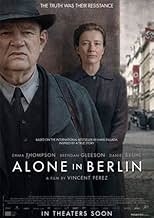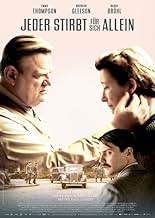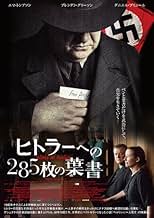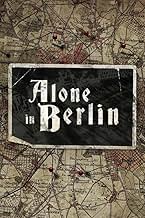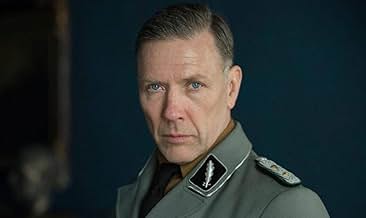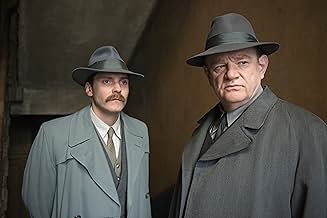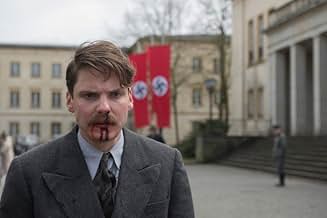NOTE IMDb
6,5/10
10 k
MA NOTE
Après qu'un couple d'ouvriers allemands nazis perdent leur fils durant la Seconde Guerre mondiale, ils décident de riposter en distribuant secrètement des cartes manuscrites à Berlin dénonça... Tout lireAprès qu'un couple d'ouvriers allemands nazis perdent leur fils durant la Seconde Guerre mondiale, ils décident de riposter en distribuant secrètement des cartes manuscrites à Berlin dénonçant leur gouvernement.Après qu'un couple d'ouvriers allemands nazis perdent leur fils durant la Seconde Guerre mondiale, ils décident de riposter en distribuant secrètement des cartes manuscrites à Berlin dénonçant leur gouvernement.
- Réalisation
- Scénario
- Casting principal
- Récompenses
- 3 nominations au total
Joachim Bißmeier
- Fromm
- (as Joachim Bissmeier)
Avis à la une
This is not a happy story. It is story that opens your eyes. We have talked about it a lot since. We felt like it was something that should be seen. I would recommend it for folks curious about that era and that place in time. It seems impossible now, but you know its not. Real life stories like this tell something more for me than the big picture story.
Greetings again from the darkness. When war hits close to home, the grieving of surviving family members never ends. At the end of World War II, author Hans Fallada was given access to the Gestapo file of Otto and Elise Hampel. Fallada wrote a 1947 novel based on their story, and in 2009 it was translated to English for his bestseller "Every Man Dies Alone". Director Vincent Perez collaborated with Achim von Borries and Bettine von Borries to adapt the novel for the big screen.
Otto (Brendan Gleeson) and Elise (Emma Thompson) play a mostly quiet, working class couple who pay the ultimate price for a cause in which they don't believe. Their protest takes the form of a clandestine 2 person operation. They systematically distribute postcards with anti-Hitler messages nearly 300 of the cards between 1940 and 1942. It's a drip campaign that takes the form of non-violent political resistance, and certainly rankles those of the Third Reich.
Daniel Bruhl plays Escherich, the Nazi officer put in charge of the investigation (labeled Operation: Hobgoblin). He is charged with finding the source of the cards and punishing those responsible. As the hunt drags on, Escherich is presented as a Nazi with a conscience, and bears the brunt of his superior's frustration, while living in as much fear as those he is chasing.
The film has a somber tone, and somehow never generates the tension or dread that this couple must have been dealing with on a daily basis for so long. In fact, Alexandre Desplat's score seems to fit a movie much more intense than what we are watching on screen. Mr. Gleeson delivers his usual grounded and believable performance despite a script that could have used a bit more potency. The film does deliver the always powerful message of having no regrets when you are standing up for what's right.
Otto (Brendan Gleeson) and Elise (Emma Thompson) play a mostly quiet, working class couple who pay the ultimate price for a cause in which they don't believe. Their protest takes the form of a clandestine 2 person operation. They systematically distribute postcards with anti-Hitler messages nearly 300 of the cards between 1940 and 1942. It's a drip campaign that takes the form of non-violent political resistance, and certainly rankles those of the Third Reich.
Daniel Bruhl plays Escherich, the Nazi officer put in charge of the investigation (labeled Operation: Hobgoblin). He is charged with finding the source of the cards and punishing those responsible. As the hunt drags on, Escherich is presented as a Nazi with a conscience, and bears the brunt of his superior's frustration, while living in as much fear as those he is chasing.
The film has a somber tone, and somehow never generates the tension or dread that this couple must have been dealing with on a daily basis for so long. In fact, Alexandre Desplat's score seems to fit a movie much more intense than what we are watching on screen. Mr. Gleeson delivers his usual grounded and believable performance despite a script that could have used a bit more potency. The film does deliver the always powerful message of having no regrets when you are standing up for what's right.
this is not a terrible movie, but it's hard to capture to real terror of Nazism. the book is a tough read but it's as near as I've seen to reality. the total fear of carrying out even the most trivial oppositional act. the certainty that your life is endangered if anyone knows what you're doing - even if it's your family. people always think they would have been in the resistance, but likely they wouldn't. this movie does a reasonable job of showing that only those with nothing to lose would even think about it.
War films are stories writ large about aggression between nations. Few of them explore small-scale human undercurrents of suppressed dissent inside the countries at war. Alone in Berlin (2016) does this by looking at an ordinary working-class couple and their compulsion to express feelings about Hitler's dictatorship at time where dissent meant certain death. It is also an essay on parental grief struggling to voice its pain of loss.
Based on real events, the story opens in a small flat in Berlin where Otto Quangel (Brendan Gleeson) and his wife Anna (Emma Thompson) learn that their son has died in battle. In a long marriage that is under strain, the news pushes them further apart as they cannot console each other in grief. Otto had encouraged his son to join the Nazi army and now Anna blames him for their loss. Desperate to voice his rage against Hitler's regime, he painstakingly writes postcards and secretly leaves them on stairwells and doorways where they can be seen by passers-by: he calls them "small grains of sand in Hitler's machine". Initially he keeps Anna away from his dangerous mission, but she insists on being involved and they both become clandestine resistance fighters whose weapons are simple messages about the evils of Nazism. They manage to write and distribute over 260 cards despite extensive investigative efforts to stop them. In the process, they resurrect their marital relationship. After almost two years of card-writing they are caught and together face Nazi justice.
This film has two parallel narratives that start in opposition and end in convergence: one is Otto and Anna's actions, the other is the investigation. The first is focused on the smallness of the couple's actions in contrast to the enormous risk they are taking, like a pair of mice squeaking at roaring lions. The filming, colour palette and period setting are drab and lifeless; the atmosphere is paranoid with suspicion and mistrust; and the acting is subdued and understated. Brendan Gleeson and Emma Thompson are actors with broad performance repertoires but here they are minimalist in expression and Spartan in dialogue, with much being conveyed through furtive glances or avoided eye-contact. It is a slow-moving story, observant of small details in an alienated world. This has the effect of amplifying the intensity of Otto and Anna's actions. Close-ups of a pen leaving a trail of outrage on a small white card become powerful portraits of bravery that are ultimately futile as most of the cards were handed in to authorities. The couple's nemesis is a young German investigator (Daniel Bruhl) who pursues his work with ideological fervour for the Fuhrer but whose success turns into the film's most devastating moments of despair.
This is a joyless story about humble heroism. Otto and Anna are emblematic of ordinary people dealing with tragedy and anger inside a world of fear and danger. Far from being mere victims, their small protests seriously unsettled the Nazi hierarchy and the closing scenes are a tribute to the power of their "small grains of sand".
Based on real events, the story opens in a small flat in Berlin where Otto Quangel (Brendan Gleeson) and his wife Anna (Emma Thompson) learn that their son has died in battle. In a long marriage that is under strain, the news pushes them further apart as they cannot console each other in grief. Otto had encouraged his son to join the Nazi army and now Anna blames him for their loss. Desperate to voice his rage against Hitler's regime, he painstakingly writes postcards and secretly leaves them on stairwells and doorways where they can be seen by passers-by: he calls them "small grains of sand in Hitler's machine". Initially he keeps Anna away from his dangerous mission, but she insists on being involved and they both become clandestine resistance fighters whose weapons are simple messages about the evils of Nazism. They manage to write and distribute over 260 cards despite extensive investigative efforts to stop them. In the process, they resurrect their marital relationship. After almost two years of card-writing they are caught and together face Nazi justice.
This film has two parallel narratives that start in opposition and end in convergence: one is Otto and Anna's actions, the other is the investigation. The first is focused on the smallness of the couple's actions in contrast to the enormous risk they are taking, like a pair of mice squeaking at roaring lions. The filming, colour palette and period setting are drab and lifeless; the atmosphere is paranoid with suspicion and mistrust; and the acting is subdued and understated. Brendan Gleeson and Emma Thompson are actors with broad performance repertoires but here they are minimalist in expression and Spartan in dialogue, with much being conveyed through furtive glances or avoided eye-contact. It is a slow-moving story, observant of small details in an alienated world. This has the effect of amplifying the intensity of Otto and Anna's actions. Close-ups of a pen leaving a trail of outrage on a small white card become powerful portraits of bravery that are ultimately futile as most of the cards were handed in to authorities. The couple's nemesis is a young German investigator (Daniel Bruhl) who pursues his work with ideological fervour for the Fuhrer but whose success turns into the film's most devastating moments of despair.
This is a joyless story about humble heroism. Otto and Anna are emblematic of ordinary people dealing with tragedy and anger inside a world of fear and danger. Far from being mere victims, their small protests seriously unsettled the Nazi hierarchy and the closing scenes are a tribute to the power of their "small grains of sand".
"Alone in Berlin" (German-French-British co-production; 2016 release; 105 min.) brings the story of a German couple, Otto and Anna. As the movie opens, we see a young German soldier running through the weeods, and he is shot and killed. The young man's parents, Otto and Anna, are informed by letter of his death, and they don't know how to cope with this tragic news. Eventually Otto decides to speak up against the Nazis, and Hitler in particular, by leaving provocative postcards (such as: "Hitler is a liar, Hitler is a killer") in prominent public places. Anna joins him in these potentially dangerous tasks. Eventually, the Nazis become aware of this, and a manhunt is started... At this point we're 15 min. into the movie, but to tell you more of the plot would spoil your viewing experience, you'll just have to see for yourself how it all plays out.
Couple of comments: this is the latest movie from Swiss actor/writer/producer/director Vincent Perez. Here he takes what amounts to a footnote in the annals of WWII and makes it, or at least tries to make it, into an epic battle between an elderly couple and the Nazi establishment. At certain moments, in particularly later in the film, it works quite well. But there are too many times that the films truly feels staged, I mean you can practically hear the director yell "and.... ACTION!", and an entire street with 1940s cars comes alive. The lead performances by Emma Thompson (as Anna) and Brendan Gleeson (as Otto) are fine, as they bring a quiet dignity to this couple that is so outraged by the tragic death of their son. Incidentally, it isn't until the closing credits that we get confirmation this movie is based on true events, and Otto and Elise really did exist (why they changed the woman's name to Anna, is not clear to me). Still, when all is said and done, it feels to me like the movie didn't quite carry this to its full potential, and that's a shame.
I had heard of this movie, but never had a chance to see it in the theater. I did catch it recently on Showtime. If you are interested in WWII, even if only a footnote of it, I'd suggest you check this out, be it on TV or VOD, or on DVD/Blu-ray, and draw your own conclusion.
Couple of comments: this is the latest movie from Swiss actor/writer/producer/director Vincent Perez. Here he takes what amounts to a footnote in the annals of WWII and makes it, or at least tries to make it, into an epic battle between an elderly couple and the Nazi establishment. At certain moments, in particularly later in the film, it works quite well. But there are too many times that the films truly feels staged, I mean you can practically hear the director yell "and.... ACTION!", and an entire street with 1940s cars comes alive. The lead performances by Emma Thompson (as Anna) and Brendan Gleeson (as Otto) are fine, as they bring a quiet dignity to this couple that is so outraged by the tragic death of their son. Incidentally, it isn't until the closing credits that we get confirmation this movie is based on true events, and Otto and Elise really did exist (why they changed the woman's name to Anna, is not clear to me). Still, when all is said and done, it feels to me like the movie didn't quite carry this to its full potential, and that's a shame.
I had heard of this movie, but never had a chance to see it in the theater. I did catch it recently on Showtime. If you are interested in WWII, even if only a footnote of it, I'd suggest you check this out, be it on TV or VOD, or on DVD/Blu-ray, and draw your own conclusion.
Le saviez-vous
- AnecdotesBased on the novel "Jeder stirbt für sich allein" (Every Man Dies Alone) by Hans Fallada. The novel was allegedly based on Gestapo files to which Fallada was given access.
- GaffesEmma Thompson wears her wedding ring on her left hand. Germans, both men and women, wear them on their right hands. The German actor who plays Judge Fromm correctly wears his wedding ring on this right hand.
- Citations
Otto Quangel: What more can a man donate than his child?
- ConnexionsVersion of Jeder stirbt für sich allein (1962)
Meilleurs choix
Connectez-vous pour évaluer et suivre la liste de favoris afin de recevoir des recommandations personnalisées
- How long is Alone in Berlin?Alimenté par Alexa
Détails
- Date de sortie
- Pays d’origine
- Site officiel
- Langue
- Aussi connu sous le nom de
- Alone in Berlin
- Lieux de tournage
- Sociétés de production
- Voir plus de crédits d'entreprise sur IMDbPro
Box-office
- Montant brut aux États-Unis et au Canada
- 33 125 $US
- Week-end de sortie aux États-Unis et au Canada
- 8 869 $US
- 15 janv. 2017
- Montant brut mondial
- 1 205 598 $US
- Durée1 heure 43 minutes
- Couleur
- Rapport de forme
- 2.35 : 1
Contribuer à cette page
Suggérer une modification ou ajouter du contenu manquant

Lacune principale
By what name was Seul dans Berlin (2016) officially released in India in English?
Répondre

